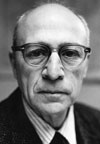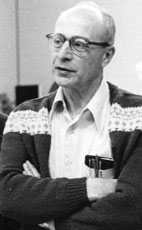 Longtime geography professor Theodore Herman, whose keen interest in issues of war and peace led to his founding of the university’s Peace and Conflict Studies Program (P-Con), died Thursday, Dec. 30. He was 97.
Longtime geography professor Theodore Herman, whose keen interest in issues of war and peace led to his founding of the university’s Peace and Conflict Studies Program (P-Con), died Thursday, Dec. 30. He was 97.
Herman joined 51łÔąĎÍř’s faculty in 1955, retiring in 1981. He taught cultural geography, passing on to many students his love of that discipline and leaving an indelible impression thatmany alumni still recall today.
Herman was an active leader of anti-war workshops on campus in the late 1960s. He served as director of the P-Con program, which was originally called the Peace and World Order Studies Program, until his retirement.
He continued to support the program in many ways following retirement, and also was instrumental in developing the Fund for Peace Research, which supports student summer internships in peace-building NGOs.
During the 1970s, one of Herman’s classes organized, wrote, and published the Hamilton Walk Book, a valuable introduction to the local area that is currently being updated and will be reissued by the 51łÔąĎÍř Press.

Herman earned degrees from Swarthmore College (BA), Columbia University (MA), and the University of Washington (MA, PhD).
His doctoral dissertation dealt with China’s export handicraft industries to 1930. As a resident of China from 1936 to 1948, he taught at the Shanghai American School and served as a social worker with the Friends Center in Shanghai.
He was interned by the Japanese and repatriated during 1942-43, after which he worked with the U.S. Office of War Information and the United Nations Relief and Rehabilitation Administration in Chungking and Shanghai.
Herman donated to 51łÔąĎÍř a collection of modern Chinese woodcuts, reputed to be the largest such collection in the United States.
In 2008-2009, he was honored for his generosity and service to the university during a special exhibition — A Year of Chinese Art at 51łÔąĎÍř — that encouraged students to engage with Chinese artistic culture.
Robert H.N. Ho ’56, who had developed a strong relationship with Herman dating back to his days as a student, provided support for the exhibition.
Herman’s last visit to 51łÔąĎÍř was in 2007 for the dedication of the Robert H.N. Ho Science Center, when he was able to tour the new home of the geography department that he had helped shape through his years of teaching and as department chair.
Herman is survived by his daughter, Evelyn, of California, as well as a nephew, Walter Liang, of California, and a niece, Mag Seaman, of Colorado. He was pre-deceased by his wife, Evelyn (Chen Shih-ying) and a son, Carl.
The Lancaster Friends will hold a memorial service at 1 p.m. on Saturday, Jan. 22, in The Meeting House, 110 Tulane Terrace, Lancaster, Penn. Anyone who plans to attend the service should contact Joe DiGarbo (jdigarbo@gmail.com).
An on-campus memorial service is planned for this spring. Details will be provided when they become available.